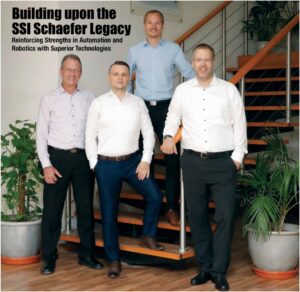
SSI Schaefer’s core focus is to build long lasting and supportable solutions for its customers and partners
With the global growth outlook remaining uncertain, there is a stronger need than ever for companies to look for new ways to grow and add value. Creating new and evolving old business models to drive innovation is one way companies can respond to new risks and opportunities.
SSI Schaefer has been in the lead for increased agility and intelligence for robotics and automation in warehouse and other diverse operations. From greater flexibility and scalability to productivity gains, a faster ROI compared to other automation solutions and better resource management, the company has spearheaded the use of production and control systems, computers and the latest in Information Technology in handling processes and machinery in industry.
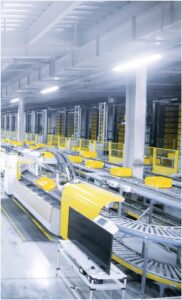
To explain and elucidate the latest forays in SSI Schaefer’s quest for excelling in its key robotics and automation operations, Global Supply Chain empanelled a core group comprising Matthias Hoewer, Regional General Manager; Carsten Spiegelberg, General Manager, Logistics Solutions, (Automation); Alexander van den Oever, CSS HUB Manager MEA & Africa (Customer Service and Support) and Cosmin Sebastian Ilie, Country Manager—GM, UAE-Middle East and Africa.
Global Supply Chain (GSC): SSI Schaefer has made Innovation and Sustainability the centerpiece of its current strategy. Talk to us about the why and briefly how SSI Schaefer plans to use Robotics and new sophisticated solutions to foster innovation and sustainability objectives?
Matthias Hoewer (MH): Innovation and Sustainability are decisively forming part of an end-to-end concept for our comprehensive solutions. Starting with the product design and manufacturing processes to harnessing the highest efficiency classes for motors, bearings, other eco-friendly recycled materials and ending with long lasting customer support to maintain this high level of efficiency throughout decades of operations, every aspect of our operations is geared to meet our exacting standards.
Smart solutions and Robotics are used to support the optimization of resources within warehousing operations. They allow us to achieve better utilizations rates by smarter resource management and shorter turnaround times of orders within a distribution centre.
The equation is quite simple: Smarter warehousing allows better utilization and therefore less equipment, materials and energy have to be used to achieve the same output.
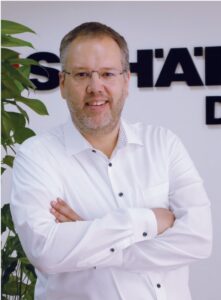
GSC: As a logistics and materials handling specialist what role do you see for SSI Schaefer “to meet the growing expectations and demands of your customers more efficiently and sustainably” in the words of your CEO, Steffen Bersch?
MH: The demand to design and act more efficiently and sustainably is visible across many industries nowadays. As outlined above it is our role to support our clients along the design process of their warehousing facilities.
Adding another feather to our long list of accomplishments, SSI Schaefer has joined the ‘50 Sustainability & Climate Leaders’ initiative a few years back and as a family owned business looking back at more than 80 years of company history, it is certainly in the nature of our DNA to build long lasting and sustainable solutions for our customers and partners.
GSC: Do you sense the same fervor for modernization, digitalization and sustainability in automation and materials handling sectors in the region?
Carsten Spiegelberg (CS): We do indeed see a strong trend for modernization and digitalization towards automation of intralogistics processes and sustainability plays a significant role in all areas, not only in terms of using sustainable equipment to provide sustainable solutions, but also use automated solutions to provide sustainable processes and structures.
This includes the implementation of semi- and automatic solutions in warehousing and order fulfillment in general, the use of sustainable solutions with energy efficient mechanisms and components, the provision of solutions to facilitate sustainable warehousing and order processing and finally the provision of solutions to support sustainable processes such as vertical farming and others.
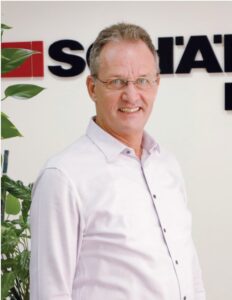
GSC: How then specifically is SSI Schaefer replicating this strategy for the Middle East and how is the region responding to these new initiatives?
CS: With its international presence, its comprehensive portfolio and strong innovation capabilities, SSI Schaefer is well prepared to adapt to respond effectively to the specific needs of individual customers. Our customers in the Middle East have always been at the forefront of energy efficient solutions, in particular with semi-automated solutions for temperature-controlled operations in the food and beverage industry.
At the same time SSI has put the sustainable increase in energy efficiency, low energy consumption and minimal wear of the individual components in focus when developing its latest ranges of automated storage and transportation systems.
Our growing local workforce, in close co-operations with the competence centers in our European and Asian headquarters assures that our customers in the region have full access to these innovations, whilst maintaining individual consultation in the local context.
GSC: How has this new focus influenced and affected your performance in the region?
CS: Our continuous focus to provide sustainable solutions and systems has been well received all over. Our energy efficient automated warehouses ensuring sustainable supply chain operations can be found across Asia, not only in places like Korea and Singapore, but also Taiwan, Vietnam, and others, and have most recently been complemented by two cold store ASRS system in the Philippines, dubbed to provide ‘Resilience against climate change and unpredictable events such as the Covid-19 pandemic’.
Whilst warehouse operators in the Middle East are still taking a more cautious approach towards major investments, we can also here see an increase of our business towards sustainable semi- and fully automated warehouse and other supply chain related solution.
GSC: How is the extraordinary growth of E-commerce impacting your business?
CS: Even before the coronavirus pandemic, the retail landscape was changing quickly. E-commerce has been on a stable growth trajectory for some time, with retailers and manufacturers planning their operations and fulfillment strategies to meet future online market demands.
This did force us at an early stage to come up with streamlined, yet flexible fulfillment solutions, modular, efficient and fast and easy to implement.
GSC: What are your expansion plans for the region? What are the top three countries in the Middle East in business prospects and potential?
MH: We are in the unique and enviable situation to say that we can support our clients throughout the entire MEA region already! We do this either through our own in-house teams located in the UAE, Saudi Arabia and South Africa, or through one of our partners within SSI Schaefer’s wide distributor network across the Middle East Africa region.
The highest potential for larger automated solutions is definitely within the three core markets where we are already directly represented and I believe this will remain the same at least for the next 3-5 years.
Automation is either driven by volumes or by high operational costs, so it wouldn’t surprise me if countries like Egypt, Nigeria or Pakistan will show a growing demand for automated solutions in the near future as well.
GSC: What are the current opportunities in store, competition and challenges for SSI Schaefer in the region going forward?
MH: Globally the outlook for the logistics industry is excellent. The demand clearly outweighs the available resources, which also brings us directly to the challenges for our region. Central Europe, North America and other countries seem to move faster out of the current pandemic than the broad MEA region.
Investment plans are approved quicker and with a longer ROI’s in mind. In times where steel prices or shipping rates rise in double digits on monthly basis, where semi-conductors and electrical components are facing a global shortage, quick and controlled decisions are the key to secure the scarce available resources.
I have to admit, I wish our markets would move quicker in this regard. To counter these shortages, we are pushing towards optimization of existing resources as well. We accomplish this either by retro-fitting or upgrading existing customer sites or by maintaining them in the best possible way through our Customer Service teams.
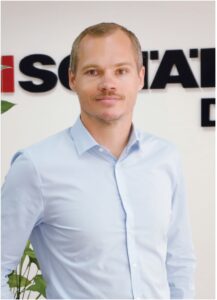
GSC: Talking about Customer Service, how does SSI Schaefer approach this topic with its automation customers in particular?
Alexander van den Oever (AvdO): Customer Service has become one of the main business drivers for the last couple of years. The Schaefer Maintenance Philosophy (SMP) to our clients is 100% flexible and available to all our customers and it is not limited to automated systems.
From simple Service Level Agreements (SLAs) for annual rack maintenance programmes, to the fully customized ‘all inclusive’, resident maintenance solutions, it is an individual task to pick the right service solutions from our catalog of services for each customer site.
It is important to point out thou, that SSI Schaefer’s strength lies in the local availability of service engineers. By now close to 40% of our job roles in the MEA region are somehow related to Customer Service and Support.
GSC: You mentioned a topic called Resident Maintenance, which we hear more and more in regards to larger automated solutions. Can you explain the concept in more detail for us?
AvdO: The concept of RM or Resident Maintenance has been very common in other parts of the world for many years. Now with the development of larger and more complex automation sites in the MEA region the demand for such services is increasing year by year.
In this concept, SSI Schaefer, as the supplier and manufacturer of the provided automated systems and equipment, takes over the technical service and maintenance with its own technicians and site engineers and becomes a permanent part of our clients’ operational team on site.
Starting with the hiring and on boarding process, team setup and training, up to spare parts management and IT services, the RM team can provide all required technical services which allows our customers to put their own focus on the daily operations.
This constitutes a clear win-win situation, especially for customers that have not been exposed complex automated solutions in the past.
GC: What trends and advent of technologies do you foresee in intra-logistics for the region?
MH: Returning back to the topic of sustainability another global trend, with a huge potential for the logistics industry, is the topic of food security or especially urban farming.
On one hand we see regions like the Middle East with a major shortage of water or agricultural soil, On the other hand we see traditional agricultural countries being exposed to climate change driven droughts or flooding. Both are facing the same issues, with common farming technologies, the risks of highly fluctuating harvests are increasing year on year.
The technological improvements in the sector of vertical farming in recent years are amazing and in combination with automated or semi-automated logistics solutions it will become a game changer for sure.
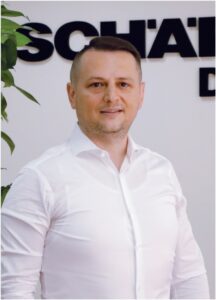
GSC: Agricultural sustainability and vertical farming are clearly the new ‘mantra’ in the present scenario…..what is your contribution to this sector in the region and what prospects do you foresee?
Cosmin Sebastian Ilie (CSI): SSI Schaefer has been active in the AgriTech sector for a number of years now. We position ourselves as a technology partner and have globally been very successful with our partnership with the German urban farming pioneer Infarm.
Combining Schaefer automation technology with Infarm’s concepts and expertise for urban farming have shown great results and if you ever visit some of the major German food retailers, the delicious Infarm greens and herbs are displayed there!
You may not have to travel all the way to Germany to witness the. The great news is that SSI Schaefer and Infarm will showcase a small exhibit at this year’s Expo 2020 Dubai within the German Pavilion!
GSC: How are you preparing for the upcoming Expo 2020 and what is your level of participation and exposure in the same? What are you planning to highlight?
CSI: We are very excited to be a partner for this prestigious and important event. Located within the German Pavilion, SSI Schaefer together with Infarm and other German companies will showcase a small snippet of sustainable urbanization.
Unlike usual exhibitions where the focus is on products and solutions, the Expo 2020 experience is aiming at education and entertainment for the entire family. We hope to meet our potential customers there and demonstrate our vision of a sustainable future.
GSC: What potential do you foresee in the agriculture and food security segments going forward?
CSI: I believe especially the start of the Covid-19 pandemic has shown us the weaknesses of the current and traditional food supply chain structures. Carrying around fresh fruits and vegetables halfway around the globe, might not be the best idea after all.
Especially long-term urban farming will allow us to reduce water consumption, grow healthier food and reduce the carbon footprint by reducing transportation distances between the source of the produce and the consumer.
The technology is still in a startup phase for many products. Focus today is on leafy greens, fish or protein-based animal feed. The outputs are constantly growing, the product range is constantly growing and the overall energy consumption versus the output is constantly decreasing from generation to generation. I believe there is still a lot more to expect in the coming years.
GSC: What are the other intended areas / verticals of growth for SSI Schaefer in the region?
MH: I strongly believe the region is still in a bit of a ‘catch-up mode’ in regards to automation technology in general. Traditional market sectors like Food & Beverage, Fashion, Pharma or Retail has not yet reached 100% saturation and it will become more common to upgrade from conventional warehousing solutions to AS/RS, shuttles or conveying solutions.
Being in the region for almost 14 years now, I have witnessed a constant growth in interest and demand for such solutions. Automation is not the solution for everything, but for a growing number of our clients, it does become a viable option worth pursuing.
GSC: What have been some of your recent major introductions and accomplishments in the region? Please elaborate?
MH: Outside of contracts, customers and orders, I personally feel that our biggest accomplishment throughout the pandemic is that we did manage to keep the team together and that every single employee did her or his utmost to adapt to the new situation and perform under sometime very difficult conditions and challenges.
A huge thank you to my team at this point! Our stamina as a company in these unforeseeable times is now helping us to be ready and grow the business in post-pandemic conditions.






